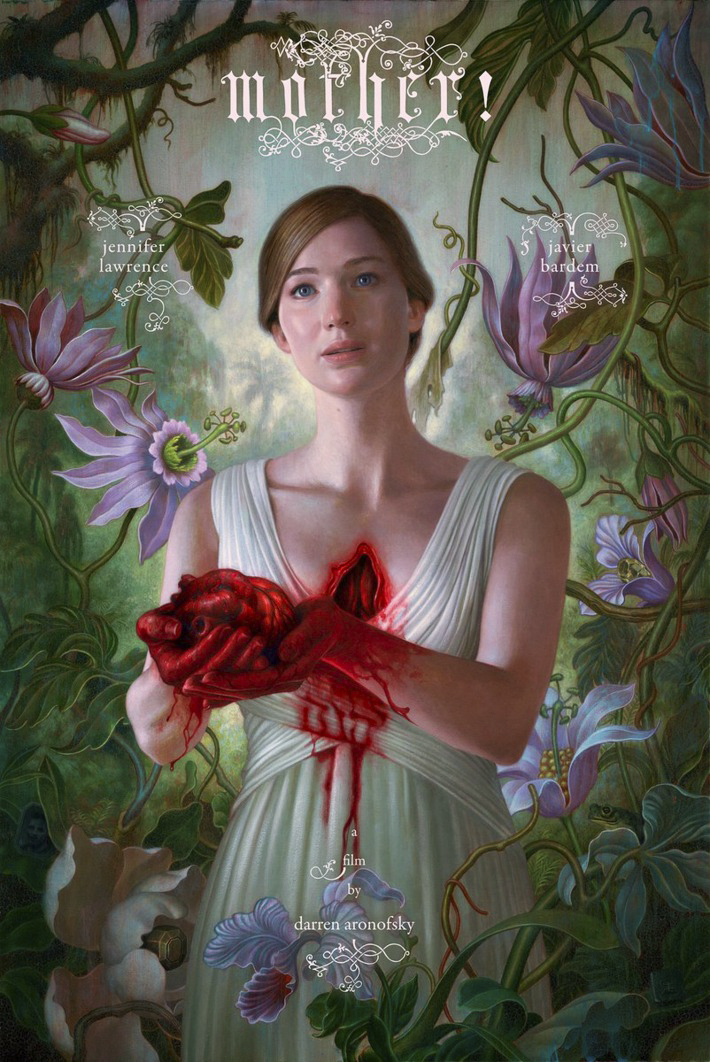
c/o indiewire.com
One of the most telling lines in “Mother!” is uttered by Michelle Pfeiffer about halfway through the film. Speaking on the topic of children, she offers these words: “You give, and you give, and you give. It’s just never enough.” This notion, of motherhood as a sort of “Giving Tree”–esque parasitism, is one of the major themes of Darren Aronofsky’s nightmarish new creation, on levels far beyond its basic premise.
Fade in on an idyllic, isolated country home. In it lives a seemingly happy couple: Jennifer Lawrence (billed simply as “Mother”) emerging onto the screen fresh-faced and wearing all white, is a vision of purity and fertility. She does not drink, shudders at the sight of a cigarette, and is a literal homemaker—after a fire more or less destroyed the entire house, she has worked painstakingly to rebuild and revitalize each and every room in an attempt to create a “paradise.” Her husband (Javier Bardem, billed as “Him”) is a poet who spends his days stuck in writer’s block, desperate for inspiration.
This peaceful existence is called into question when a stranger (Ed Harris, “Man”) arrives at the house. A fan of Him’s poetry, he claims to have thought the house was a bed and breakfast. Him invites the Man to stay, wholly disregarding Mother’s wariness, and the two spend the night drinking and smoking. The next day, a Woman claiming to be Man’s wife arrives. Him invites her, too, to stay in the house indefinitely, despite Mother’s objections. The two form a rather unpleasant pair of guests, entering rooms they are told not to, knocking things over, prying into the lives of Mother and Him. Mother tries to be welcoming and cordial, but the two continue to take advantage of her hospitality. Their nuisance pales in comparison with what’s to come, though, and as the plot progresses, the film’s seemingly simple premise devolves into total pandemonium as plot and character take a backseat to analogy and symbolism.
Steeped in subtext and layered in meaning, “Mother!” is an ambitious, volatile, and emotionally draining monster of a film. It spans multiple genres, first appearing as a Gothic domestic drama, then as a paranoia-ridden psychological thriller in the vein of “Rosemary’s Baby,” then as an artist’s introspective manifesto and, ultimately, through heavy use of allegory, a towering creation myth. Watching the film unfold requires a certain amount of faith, not to mention stamina, from the viewer, who must simply let the film take the wheel and ride the ensuing roller coaster of escalating chaos.
The filmmaking style, which grips viewers from the beginning and carries them through the film’s entirety, makes this secession of control fairly easy. Matthew Libatique, Aronofsky’s frequent collaborator (“Black Swan”; “Requiem for a Dream”) helms the cinematography, which, done exclusively in handheld shots, retains a sense of unease and claustrophobia, pulling the audience into room after room of the house with dizzying effect. The sound design, too, contributes vastly to the film’s unsettling atmosphere, with each creak and moan of the house imbuing the audience with a potent sense of dread. (It is a single sound, heard near the film’s cataclysmic end, that creates what is arguably one of the most disturbing moments in cinema.)
Despite all that Aronofksy manages to get away with, it is clear that the film would not have succeeded without the support of well-crafted performances, which are necessary for grounding the film in some sort of reality during its extensive flights of deranged fancy. Jennifer Lawrence, coming off 2016’s disappointing “Passengers” and somewhat of a decline in favorable public opinion, fully redeems herself as Mother, painting the luridly vivid portrait of a woman slowly drained of her vitality, expressing a sense of restraint and vulnerability that proves a change from her typical tenacious heroines (“The Hunger Games” series) and determined underdogs (“Silver Linings Playbook”; “Joy”). She gives the all-consuming performance typical of an Aronofsky heroine, and while her total commitment is clear (she allegedly dislocated a rib hyperventilating during one of the film’s climactic scenes), she never appears to be trying too hard, refusing to let her character get overshadowed by the effort the performance demands.
Pfeiffer, too, is a joy to watch, bringing a darkly comic element to her intrusive and abrasive Woman. Bardem successfully straddles the line between loving husband and selfish narcissist; his stringing Lawrence along throughout the film is made plausible by a combination of his ability to charm and the chemistry between the two leads.
Walking into the theater to see “Mother!” means signing on not only to be dragged through hell and back, but also to enter a guessing game as to what the shape-shifting film is truly about. (I found myself getting distracted from viewing the film critically, instead of attempting to decode each symbol and metaphor.) Viewers can truly pick their poison from a wide selection of topics, ranging from the creation (and fall) of man, organized religion, female roles in society, celebrity status, the parasitic relationship between artist and inspiration, and the ruinous effect of humanity on Mother Nature’s creation. Regardless of interpretation, viewers will not have to stretch to pull meaning out of this idea-stuffed, meticulously chaotic thrill ride.
“Mother!” opened on Friday, Sept. 15 and is now playing in theaters nationwide.
Fritz Spofford can be reached at fspofford@wesleyan.edu.